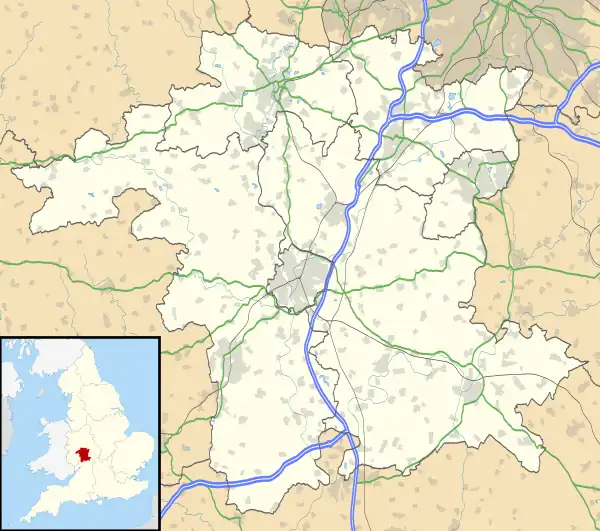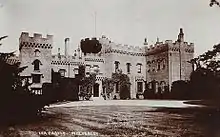Wolverley
Wolverley is a village; with nearby Cookley (1 mi northeast), it forms a civil parish in the Wyre Forest District of Worcestershire, England. It is 2 miles north of Kidderminster and lies on the River Stour and the Staffordshire and Worcestershire Canal. At the time of the 2001 census, it had a population of 2,096.[3]
| Wolverley | |
|---|---|
 Wolverley village | |
 Wolverley Location within Worcestershire | |
| OS grid reference | SO835795 |
| District | |
| Shire county | |
| Region | |
| Country | England |
| Sovereign state | United Kingdom |
| Post town | Kidderminster |
| Postcode district | DY10, DY11 |
| Dialling code | 01562 |
| Police | West Mercia |
| Fire | Hereford and Worcester |
| Ambulance | West Midlands |
| UK Parliament | |

Notable features
There are 13 Listed Buildings within Wolverley, three of which are grade II*.[4]
One of the unusual features of the area are rooms cut into the sandstone cliffs behind some of the houses. In the centre of the village, next to the Queen's Head Public House car-park are some caves which reflect this usage.[4]
Wolverley has one of the few remaining animal pounds in the area.[5]
St. John's Church
Woverley's Church of England and parish church is dedicated to St. John. It is claimed as a tradition that there has been a church or chapel on the site since Anglo-Saxon times. The first documented evidence of a church was the mention of a parish priest in the village in the Domesday Book (1086). A church on the site of the current parish church site has been in deanery of Kidderminster since the 13th Century. The current building was consecrated on 20 September 1772, and belongs to the Church of England. The current clergyman with responsibility is The Revd Shaun Armstrong[6]
History
Wolverley was recorded in the Doomsday Book (1086) under an ancient spelling of Ulwardelie.[7]
John Atte Wode is recorded as holding land at Wolverley prior to 1357.[8]
The Legend of the Swan
According to ancient legend a crusading member of the Attwood family was rescued from a dungeon and returned to his home Wolverley Court by a swan.[9][10]
William Sebright
Wolverley was the birthplace of William Sebright, who as a Town Clerk of London accumulated an estate in Bethnal Green, which he left in his will of 1620 for the foundation of a grammar school in Wolverley.[11] The site of the original Wolverley Grammar School is still in the centre of the village: the grammar school changed its name to Sebright School in 1931 when it moved to a new site. The new school was opened by Bewdley-born Stanley Baldwin.[12] Between 1948 and 1970 Sebright was a public school, and from 1965 to 1969 the sculptor Fritz Steller was the Head of Art. Sebright School closed in 1970[13] and reopened as Wolverley High School, now called Wolverley C E Secondary School, a state run secondary school. However, the junior wing, Heathfield Knoll School, continued in existence and now includes pupils up to 16. Over the years the endowment left by William Sebright has grown to millions of pounds, and the original scope of the educational foundation he set up has been broadened to include grants to local schools, and to former pupils of those schools.[14]
Tinplate Industry
Wolverley Lower Mill, which was established in 1670 by Philip Foley and Joshua Newborough, helped the village play a key role in the early tinplate industry.[15]
Baskerville the printer
The village was also the birthplace of John Baskerville, the celebrated printer (1706–1775).[16]
Wolverley Camp
During the Second World War the US Army Medical Corps opened its award-winning 52nd general hospital at Wolverley Camp.[17]
Gallery
 The sign next to the entrance says "Wolverley Pound, formerly used for impounding animals found straying until ransomed by their owners".[18]
The sign next to the entrance says "Wolverley Pound, formerly used for impounding animals found straying until ransomed by their owners".[18] A half-timbered cottage on The Cottages road in Wolverley that has back rooms built into the sandstone cliff.
A half-timbered cottage on The Cottages road in Wolverley that has back rooms built into the sandstone cliff. Entrances to man made caves at the back of the Queen's Head car park in Wolverley
Entrances to man made caves at the back of the Queen's Head car park in Wolverley.jpg.webp) The Court House a private residence.
The Court House a private residence. The Stour downstream of Wolverley Bridge.
The Stour downstream of Wolverley Bridge. The Lock pub next to Wolverly Lock on the Staffordshire and Worcestershire Canal
The Lock pub next to Wolverly Lock on the Staffordshire and Worcestershire Canal Bodenham Arboretum[19]
Bodenham Arboretum[19]
See also
- Castle Hill, Wolverley, the site of Medieval ruins.
- Drakelow Hillfort, a small multivallate Iron Age hillfort, located on a promontory (known as Drakelow Hill)
- Richard Baxter Monument, was built around 1850 in memory of Richard Baxter (1615–1691), a Kidderminster-based English Puritan church leader, poet and hymn-writer. The monument is a Grade II listed structure and resides on a hilltop on Blakeshall Common.
- Sebright Baronets
Notes
- VCH, Worcs, op.cit
- "1–20 of 957 results for lea castle". Metropolitan Museum of Art. Retrieved 13 July 2012.
- "2001 Census" (PDF). Archived from the original (PDF) on 18 February 2009.
- Wolverley Conservation Area Character Appraisal (PDF), Wyre Forest District Council, July 2007, p. 17
- Wolverley Conservation Area Character Appraisal, Wyre Forest District Council, July 2007, p. 23,
The animal pound, and the surrounding grass is currently completely fenced off with hoped railings, whilst the original door is now looking in poor condition. As part of the history of the Area, and one of the few such remaining pounds in the area, this feature should be enhanced.
- Church staff. "St. John's Church in Wolverley". St. John the Baptist Church Wolverley. Retrieved 13 July 2012.
- Allies 2003, p. 307.
- Driver, J. T. Worcestershire Knights of the Shire 1377–1421 Transactions of the Worcestershire Archaeological Society. Third Series Vol 4 1974 p20
- ""Parishes: Wolverley"", Victoria County History, Worcestershire, vol. 3, 1913, pp. 567–573
- Church staff. "The Legend of the Swan". St. John the Baptist Church Wolverley. Retrieved 13 July 2012.
- "Bethnal Green: Estates", in A History of the County of Middlesex: Volume 11, Stepney, Bethnal Green, ed. T F T Baker (London, 1998), pp. 155-168. (Full text via British History Online.) [accessed 15 July 2020]
- "Arrangements for to-day", The Times, London, 10 October 1931, p. 15.
- "School to close", The Times, London, 21 February 1970, p. 3.
- Old Wolvernian Association 2006.
- King 1988, pp. 104–13.
- "Famous Brummies and others that worked or lived in Birmingham". Archived from the original on 19 September 2008.
- DiGi-Masters.com. "ex-Army Barracks near Kidderminster". Wolverley Camp. Retrieved 3 May 2015.
- Wolverley Pound entrance, 20 June 2018
- Bodenham Arboretum
References
- Allies, Jabez (2003), On the Ancient British, Roman and Saxon Antiquities and Folklore of Worcestershire, Kessinger publishing's rare reprints (reprint ed.), Kessinger Publishing, p. 307, ISBN 9780766162259
- King, P. W. (1988), "Wolverley Lower Mill and the Beginnings of the Tinplate Industry", Historical Metallurgy, 22 (2): 104–113
- Sebright Education Foundation – Chapel fund, Old Wolvernian Association, 5 July 2006, retrieved 3 May 2015